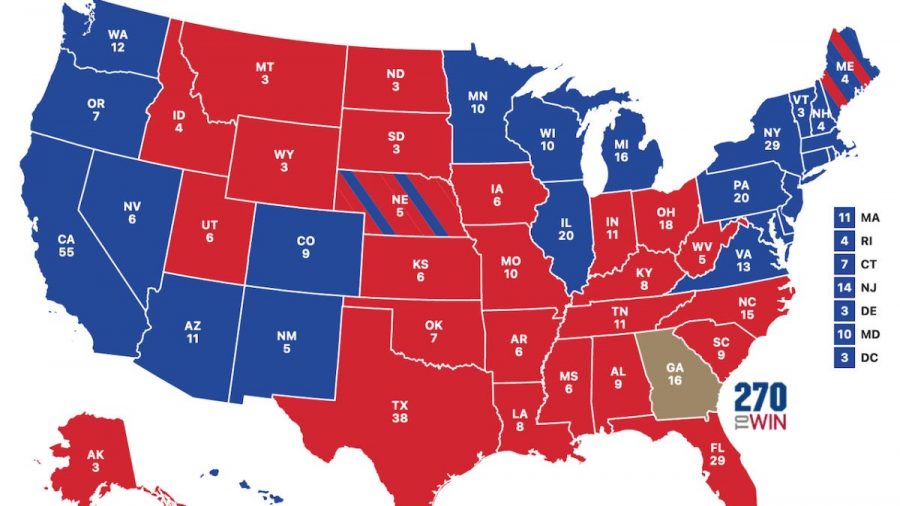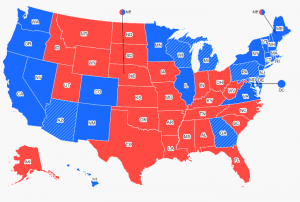Former Vice President Joe Biden elected 46th president, Democrats maintain House, toss-up in Senate
Georgia was the last state to be called in the 2020 election with 16 electoral votes going to Biden. Biden received 306 electoral votes and Trump 232 total.
On Nov. 7th, former Vice President Joseph R. Biden Jr. was elected the nation’s 46th president, defeating President Donald J. Trump by a margin of 74 electoral votes and 5.5 million votes nation-wide. Biden defeated Trump after winning Pennsylvania, putting him above the required 270 electoral votes needed.
More Americans voted in this presidential election than any of the past 100 years, breaking records for both political parties. According to Bloomberg, 152 million of 157-165 million votes have been counted, the largest number in any election.
Junior Larry Bu volunteered as an election worker because of the opportunity to help out his community. “The weekdays saw much more people voting rather than weekends, which were quite slow,” Bu said. “I would assume part of this is because more people mailed in ballots given the pandemic.”
Similar to how the razor-thin margin of votes in favor of Republican party in swing states determined the 2016 race, the majority of Americans believed this election would boil down to the handful of toss-up states: Arizona, Iowa, Ohio, North Carolina, Georgia, Michigan, Minnesota, Wisconsin, Texas, Nevada, Pennsylvania, Florida and New Hampshire. Of the 13 battleground states, eight swung in favor of Biden including Arizona, Michigan, Wisconsin, Pennsylvania and Georgia, which had flipped from Trump’s favor in the 2016 election. Biden also carried all the states that former U.S. Secretary of State Hillary Clinton had won in 2016.
With persisting issues including the Coronavirus, healthcare, Supreme Court appointments, the environment, recession recovery and racial and economic inequality, many considered the election to be the most important election of their lifetime. Of these issues, nearly eight in 10 registered voters considered the economy to be “very important” to their vote, as a poll conducted by the Pew Research Center reported that it was a top concern for 79 percent of registered voters.
For senior Merril Heitz, many of the issues were intersectional. “The most important issue for me in this election was choosing a president that I believed would be the best in ensuring that all Americans would be equally protected under the law. Whether it’s in the workplace, for healthcare, for housing or other issues, all Americans have the right to feel safe, healthy and protected in the country they live in,” Heitz said.
Americans are also electing members to the House of Representatives and Senate. While the Democratic party kept their hold of the House after passing the 218 seat mark, their majority weakened after losing nine seats to the Republican party.
In the senate, 33 of the 35 races have been called with 50 seats occupied by the Republican party and 48 by the Democratic party, including two independents. In order to win the majority and control the senate, 51 seats are required.
A weaker Democratic House majority and likely hostile Republican Senate majority could pose as an issue for Biden’s term. Gridlock could prevent Biden from making significant changes in his honeymoon period, or first 100 days. Especially with Trump refusing to admit defeat in multiple Tweets claiming election fraud and unconstitutional handling, it’s unclear whether the historically peaceful transitions of power will remain civil.
Your donation will support the student journalists of Thomas S. Wootton High School. Your contribution will allow us to purchase equipment and cover our annual website hosting costs.
Christina Liu is a 2021 graduate.










